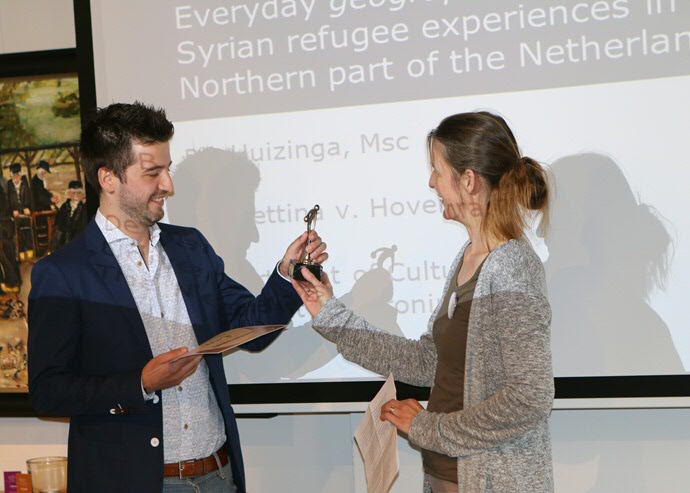Onderzoek naar place attachment bij Syrische vluchtelingen in Noord-Nederland wint Herta Macht scriptieprijs

Rik Huizinga, student Culturele Geografie, won met zijn masterscriptie over place attachment bij Syrische vluchtelingen die nu in Noord-Nederland wonen de Herta Macht scriptieprijs. Het onderzoek was gericht op mannelijke vluchtelingen en hoe hun dagelijks leven rond betekenisvolle plaatsen is gestructureerd.
De prijs, een geldbedrag van 1000 euro, wordt jaarlijks uitgereikt door de Faculteit Ruimtelijke Wetenschappen van de Rijksuniversiteit Groningen aan een student die in Nederland een masterstudie heeft gevolgd. De Herta Macht scriptieprijs heeft als doel de culturele aspecten en maatschappelijke relevantie van onderzoek in de ruimtelijke wetenschappen verder te bevorderen.
De jury bestond dit jaar uit dr. Ben de Pater, dr. Virginie Mamadouh, drs. ing. Mark Sekuur, dr. Roos Pijpers and prof. dr. Frank Vanclay (voorzitter). De uitreiking vond plaats op 4 oktober.
Samenvatting
This master thesis offers a detailed understanding of the relationship between refugees and place in the Northern part of the Netherlands. It explicitly focuses on place making strategies of Syrian male refugees and how their everyday life is structured around meaningful places. The Dutch government currently undervalues the interaction between refugees and place in the context of spatial dispersal policy. Since the host society is completely new to refugees, the social and physical environment represent traditions, practices, values, history and power structures that refugees are unfamiliar with. Feeling of exclusion impacts an individuals’ wellbeing and can limit refugees in being actively engaged in communities. To provide a rich and in-depth illustration of the daily lives of refugees, this research adopted a mixed qualitative approach. Both semi-structured interviews and walking interviews in the residential neighbourhood were used to emphasize personal experiences in a local context. In total ten Syrian male refugees participated in the research. The findings emphasize the essential role of the neighbourhood in developing integration strategies in the Netherlands as everyday life in the neighbourhood comes with opportunities and challenges. Characterized by accessibility and conversation as main activity, third places offer possibilities to engage in informal social contact with local residents. These “neighbourhood talks” provide newcomers such as refugees with a chance to develop a network of social relationships and interactions to enhance their wellbeing and give shape to daily routines. However, processes of exclusion on a neighbourhood scale can prevent social encounters from happening. As refugees in the first phase of integration are prohibited to do any work or study, they often find themselves in different time geographies from their Dutch neighbours. This limits opportunities for social encounters. Moreover, language barriers and low self-confidence make active community engagement difficult which hinders the development of becoming a full community member.
Meer informatie
Voor meer informatie over Herta Macht, de scriptieprijs of eerdere winnaars, ga naar www.rug.nl/herta-macht-thesis-award
Meer nieuws
-
01 december 2025
De kracht van beweging
-
24 november 2025
RUG en Ministerie van I&W starten brede meerjarige samenwerking
